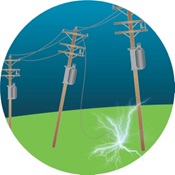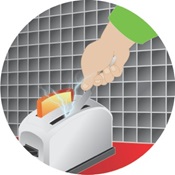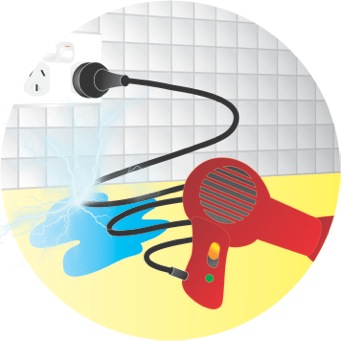Safety considerations
Outside safety – Watch out for high voltage power lines!
 We all like to play outside, but there are electrical hazards that we need to know about.
We all like to play outside, but there are electrical hazards that we need to know about.
Electricity poles and wires are all around us.
They can be above us, next to us, and even below us.
Remember these tips:
- Fires near transmission lines can be dangerous. If there is a fire, immediately call emergency services on 000.
- After a storm if you see fallen power lines stay well clear of them. There is a strong chance they are still alive
Stay safe around metal – You now know it’s a conductor!
 We all come into contact with metal objects on a daily basis – turning on a tap, playing with our computers and even using the fridge.
We all come into contact with metal objects on a daily basis – turning on a tap, playing with our computers and even using the fridge.
Metal conducts electricity so you have to be very careful when you use metal items.
Remember these tips:
- Never put a metal object like a knife into a toaster
- Never put anything in a power point that’s not meant for it. Electricity will travel right up the metal object into your body
- Be careful when climbing a ladder at home. The power lines connected to your house are usually protected, but they can be damaged by rubbing against the gutter or a tree or through exposure to the sun. If a person is on a metal ladder and touches the exposed line the electricity will travel through their body to the earth
Electricity and water do not mix!
 When water comes into contact with an electrical circuit it can begin to allow some of the charge to leak out of the device. Water can conduct electricity because electrons can flow by hitching a ride on atoms and molecules in the water. Water contains dissolved substances, such as salt. These greatly increase the ability of water to conduct electricity. That’s why electricity passes easily through our bodies – because our bodies contain water and salt. This is also why it’s important to keep water away from electrical appliances.
When water comes into contact with an electrical circuit it can begin to allow some of the charge to leak out of the device. Water can conduct electricity because electrons can flow by hitching a ride on atoms and molecules in the water. Water contains dissolved substances, such as salt. These greatly increase the ability of water to conduct electricity. That’s why electricity passes easily through our bodies – because our bodies contain water and salt. This is also why it’s important to keep water away from electrical appliances.
Remember these tips:
- If you knock an electrical appliance into water – the first thing to do is to switch off the power and unplug it from the power socket before trying to retrieve the appliance
Dangerous Situations – Don’t risk it!
Always be on the lookout for dangers in and around your home. This could be anything from a faulty electrical lead to a ‘stacked’ power point – one with too many plugs in it. These situations could be life threatening and an electrician should be called in to fix them.
Remember these tips:
- Faulty appliances and damaged electrical leads should be disconnected at the power point and fixed or replaced by an electrician
- Never stack power points. Use a power board or have an extra power point installed. Stacked power points can cause fires
- Before you or your family do any major digging in the yard you should get Mum or Dad to ring Dial Before you Dig on 1100 to make sure there are no underground cables near your property. If you hit one you could be electrocuted as well as possibly interrupting the power to your suburb
Electricity Substations – Keep away!
Substations transform the voltage generated at power stations so it can be distributed to homes, schools and businesses.
You will find electricity substations and power equipment all over the place. They are behind fences, in buildings or on the side of the footpath and most have danger signs.
Remember these tips:
- Substations contain special equipment with invisible hazards. You don’t even have to touch anything to get hurt. Just being too close to some substation equipment can be dangerous and may even kill you
What to do in an emergency?
Electrical fire – In the event of an electrical fire, never throw water or use a water based extinguisher. Call emergency 000 and get an adult to help.
Electric shock – Do not attempt to touch or rescue a person if you suspect they’ve suffered an electric shock until the power has been cut off and the situation has been made safe. Remember, if they are still in contact with the electrical source, they are still a conductor. Call emergency 000 and get an adult to help.
